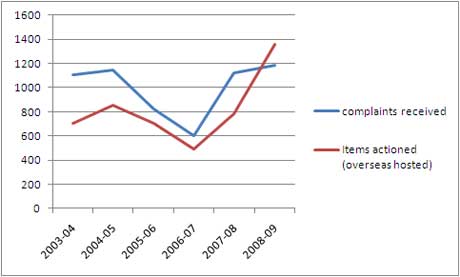2009: ACMA web investigations peak

In 2009 the Australian Communications and Media Authority (ACMA) took action over more offshore hosted websites than in any year prior, as well as referring over 900 cases to overseas law enforcement agencies.
"Items-actioned" by the content and media regulator for overseas-hosted content deemed refused classification (RC), X18+ or "potentially prohibited" hit an all time high of 1365 between 2008 and 2009 — almost double the 786 items actioned during the last period, and almost three times the number it took action on between 2006 and 2007.
The complaints-driven mechanism the system operates under means items actioned have historically been lower than the number of complaints it received over the period. However, the 2008-09 period was the first time that the number of items actioned surpassed the number of complaints it received.
Following a complaint about online content, ACMA is compelled to investigate it, and if it can verify the content is refused classification or x-rated, the site is added to its blacklist which is then distributed to filter-makers on the government's NetAlert program.
Explaining the unusually high number of items it took action on this year, ACMA in its Communications Report said that 618 of those complaints led to 1363 items being deemed "prohibited/potentially prohibited online content". It also reported that it handed 900 cases to either law enforcement or the International Association of Internet Hotlines (INHOPE) for further investigation.
Items actioned for offshore hosted content is a critical input to the ACMA-regulated list of banned websites, which last year stood at 1370 URLs, with about half of those sites related to child pornography. Locally hosted content that it actioned stood at just seven last year.
Last year's figure was also a major increase on the average number of items actioned per year over the past five years. The five-year average is around 700.
Electronic Frontiers Australia spokesperson, Geordie Guy, said the increase was likely due to the greater focus on the subject of content filtering, which reached fever pitch last year as Minister for Communications Stephen Conroy confirmed the government would go ahead with its plans to legislate a mandatory ISP filtering system.

2009: the year actions overtook complaints.
(Credit: Liam Tung/ZDNet.com.au)
"More people are aware that they have the opp to have government do something about what offends them and act on it for everyone else," he said.
However, the increased activity on ACMA's part came in spite of a fall in the number of actual complaints it received: 1222 complaints were registered between 2007 and 2008 (yielding 786 actioned items), while complaints between 2008 and 2009 stood at 1182.
Guy said it was hard to tell why ACMA takes action over certain content, describing it as a "moving goal post". "What we do know is that the time it takes to look at a complaint has gone through the roof. It used to take four to five days before you would get a response from the ACMA. Now complaints are left outstanding for months later. You will see complaints that were lodged in 2009 that won't be resolved until this year," he said.
Under the government's proposed mandatory ISP-level filtering system, this list would be distributed to ISPs, which would under proposed new laws be bound to block websites on the list.